
Journal of Computing in Higher Education
Scope & Guideline
Transforming Higher Learning with Cutting-Edge Research.
Introduction
Aims and Scopes
- Learning Analytics and Data-Driven Decision Making:
The journal emphasizes the use of learning analytics to inform teaching practices and improve student outcomes. This includes studies on data collection, analysis, and the implementation of analytics in educational settings. - Innovative Educational Technologies:
Research on the application of emerging technologies such as virtual reality, gamification, and MOOCs to enhance learning experiences and outcomes is a core focus area. - Instructional Design and Pedagogy:
The journal addresses instructional design strategies that support effective teaching and learning in higher education, including blended learning, flipped classrooms, and self-regulated learning. - Student Engagement and Experience:
Explorations into factors influencing student engagement, motivation, and learning experiences in both online and face-to-face environments are prominent themes. - Equity and Inclusiveness in Education:
The journal also focuses on the role of technology in promoting inclusiveness and addressing the needs of diverse learners, including those with disabilities.
Trending and Emerging
- Integration of Artificial Intelligence and Machine Learning:
There is a growing interest in the application of AI and machine learning to enhance educational processes, including predictive analytics and personalized learning experiences. - Focus on Mental Health and Well-Being in Online Learning:
Research addressing the psychological aspects of online learning, including social anxiety and student well-being, is increasingly prevalent, acknowledging the importance of mental health in educational success. - Adaptive Learning Technologies:
The trend towards adaptive learning technologies that customize educational experiences based on individual learner needs and behaviors is gaining momentum within the journal's publications. - Collaborative Learning in Virtual Environments:
Emerging studies focus on collaborative learning practices in virtual settings, emphasizing the role of social presence and interaction in enhancing learning outcomes. - Sustainable and Inclusive Learning Practices:
Research on sustainable educational practices and the inclusivity of diverse learner populations is becoming more prominent, reflecting a broader commitment to equity in education.
Declining or Waning
- Traditional Assessment Methods:
There has been a noticeable decline in research focused on traditional assessment methods, as the journal increasingly prioritizes innovative assessment strategies that leverage technology and analytics. - General Educational Theory without Technological Context:
Themes centered on broad educational theories that do not incorporate technology or computing perspectives have waned, reflecting a shift towards more applied and technology-integrated research. - Static Learning Environments:
Research on static or non-interactive learning environments is becoming less frequent, as the journal emphasizes dynamic, interactive, and technology-enhanced learning experiences.
Similar Journals

Technology Knowledge and Learning
Exploring New Frontiers in Learning and TechnologyTechnology Knowledge and Learning, published by SPRINGER, stands as a pivotal platform in the realms of computational theory, computer science, education, and human-computer interaction. With an impressive impact factor reflecting its reputation, this journal has consistently ranked in the Q1 quartile across multiple categories as of 2023, including Computational Theory and Mathematics, Education, and Engineering. Spanning a timeline from 2011 to 2024, it serves as an essential resource for those engaged in exploring the intersections of technology, pedagogy, and knowledge transfer, thereby facilitating advancements in both theory and practical applications. Although it is not an open-access journal, the rigorous peer-review process ensures that only the highest quality research contributes to its esteemed reputation. By providing a platform for innovative research and discussions, Technology Knowledge and Learning plays a crucial role in shaping the future of technological education and applications, making it an invaluable resource for researchers, professionals, and students alike, seeking to stay at the forefront of this dynamic field.
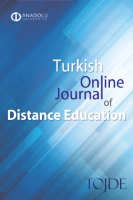
Turkish Online Journal of Distance Education
Advancing Innovations in Online Education.Turkish Online Journal of Distance Education, a distinguished publication from ANADOLU UNIVERSITY, serves as a vital resource in the field of distance education, contributing significantly to the ongoing discourse since its inception in 2000. With an impressive impact factor that reflects its standing within the academic community, this open access journal provides an influential platform for researchers, educators, and practitioners to disseminate innovative findings and educational strategies. Ranked in the Q2 category within the education sector according to the 2023 quartile rankings, and boasting a commendable position of #423 out of 1543 in Scopus' Social Sciences Education rankings, the journal places itself firmly within the 72nd percentile of its cohort. Spanning from 2004 to 2024, the journal's commitment to advancing scholarship in distance education is reflected not only in its comprehensive articles but also in its responsive engagement with contemporary educational challenges. Positioned in Eskişehir, Turkey, this journal aims to elevate discussions surrounding online learning and contributes to the global dialogue on education accessibility and innovation.
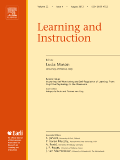
LEARNING AND INSTRUCTION
Exploring the Frontiers of Learning and TeachingWelcome to the esteemed LEARNING AND INSTRUCTION journal, a pivotal publication in the fields of educational science and developmental psychology, published by PERGAMON-ELSEVIER SCIENCE LTD. With a remarkable Impact Factor reflective of its quality (ranking in Q1 across its categories), this journal serves as a crucial platform for disseminating research that transforms the understanding of learning processes and instructional methodologies. Since its inception in 1991 and extending through 2024, LEARNING AND INSTRUCTION has consistently provided insights crucial for educators, researchers, and students alike, positioning itself among the top journals in both the Social Sciences - Education and Psychology - Developmental and Educational Psychology categories. Its rigorous peer-review process ensures that only the most impactful research reaches its readers, making it a must-read for anyone engaged in the enhancement of educational practices and learner outcomes. While it operates on a subscription model, the knowledge gained through its pages is invaluable for shaping the future of education.

Technology Pedagogy and Education
Advancing the Future of Learning through TechnologyTechnology Pedagogy and Education, published by Routledge Journals, Taylor & Francis Ltd, is a leading academic journal focused on the intersection of technology and educational practices. With an impact factor reflecting its significant contribution to the field, this journal provides a critical platform for disseminating innovative research and emerging trends in technology-enhanced learning. Serving as a resourceful hub since its inception in 2003, it has established itself in the top quartile of various categories, including Communication, Computer Science Applications, Education, and Information Systems. Researchers and educators alike will find the journal's insights invaluable as they navigate the ever-evolving landscape of educational technology. Although it does not currently offer open access options, its rigorous peer-review process ensures that only the highest quality research is published, making it essential reading for anyone invested in the educational sector.

Learning and Teaching in Higher Education-Gulf Perspectives
Connecting Research, Policy, and Practice in Higher EducationLearning and Teaching in Higher Education - Gulf Perspectives is a premier Open Access journal published by Emerald Group Publishing Ltd, dedicated to advancing knowledge in the field of education, particularly within the context of higher education in the Gulf region. Since its inception in 2004, the journal has provided a vital platform for scholarly discourse, catering to an audience that includes researchers, educators, and policymakers. With an impressive Scopus ranking, placing it in the top 30% of education journals, and a Q3 quartile classification, it consistently publishes rigorous research and innovative practices that aim to influence educational strategies and contribute to the quality of higher education. The journal supports Open Access, ensuring that research findings are readily available to the wider academic community and the public, thereby fostering informed dialogue and collaboration across disciplines. By bridging local educational insights with global trends, Learning and Teaching in Higher Education - Gulf Perspectives stands as a crucial resource for those committed to improving educational outcomes in the region and beyond.

International Journal of Instruction
Elevating the discourse in education through peer-reviewed scholarship.International Journal of Instruction is a distinguished peer-reviewed journal dedicated to advancing the field of education through high-quality research and innovative instructional practices. Published by GATE Association for Teaching & Education in Switzerland, this open-access journal has been a beacon of knowledge since its inception in 2008, ensuring that impactful educational research is freely accessible to scholars, educators, and practitioners worldwide. With an impressive Q2 ranking in Education and a notable position in the 80th percentile within its category in Scopus, the journal showcases cutting-edge studies and discussions that reflect current trends and methodologies in teaching and learning. The scope of the journal includes a wide array of topics, ranging from instructional strategies to curriculum development, making it a vital resource for anyone engaged in the dynamic landscape of education. Explore the International Journal of Instruction today to contribute to and benefit from the collective wisdom of the global educational community.

Malaysian Journal of Learning & Instruction
Exploring the intersection of culture and instruction.Welcome to the Malaysian Journal of Learning & Instruction, a prestigious open-access journal published by UNIV UTARA MALAYSIA PRESS since 2004. With a focus on advancing knowledge in the fields of education, cultural studies, and psychology, this journal serves as a vital platform for researchers, educators, and professionals to share innovative findings that address contemporary challenges in learning and instructional practices. The journal has gained recognition within the academic community, proudly achieving a Q1 ranking in Cultural Studies and a Q2 ranking in Education as of 2023, reflecting its commitment to high-quality research. Furthermore, with an impressive 94th percentile ranking in Social Sciences—Cultural Studies, it stands as a leader in fostering impactful scholarship. Researchers interested in the intersection of educational psychology and cultural discourse will find this journal to be an invaluable resource. Join us in exploring groundbreaking insights that shape the future of education and instruction.
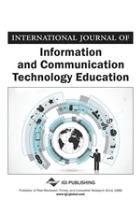
International Journal of Information and Communication Technology Education
Fostering collaboration in the realm of ICT education.International Journal of Information and Communication Technology Education (ISSN: 1550-1876, E-ISSN: 1550-1337), published by IGI Global, stands at the forefront of educational research, focusing on innovative uses of information and communication technologies in the educational landscape. With an impressive impact factor and consistently high rankings—the journal is positioned in the Q3 category for both Computer Science Applications and Education in the 2023 evaluations—this journal serves as a vital platform for scholarly contributions that aim to advance teaching methodologies and enhance learning experiences. Spanning from 2005 to 2024, it explores diverse topics in e-learning and technology-enhanced education, making it an essential resource for researchers, professionals, and students passionate about the intersection of technology and pedagogy. Though specifically not an open-access journal, the invaluable insights it offers foster knowledge dissemination and innovation in the field. Located in the United States, at 701 E Chocolate Ave, Hershey, PA, the journal remains committed to fostering a collaborative and transformative approach to learning in today's digitally-driven society.
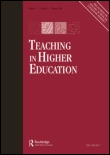
TEACHING IN HIGHER EDUCATION
Championing effective strategies for student engagement.TEACHING IN HIGHER EDUCATION is a premier academic journal published by Routledge Journals, Taylor & Francis Ltd, dedicated to advancing the scholarship and practice of teaching within the higher education sector. With an ISSN of 1356-2517 and an E-ISSN of 1470-1294, this journal is widely recognized for its profound impact in the field, boasting a 2023 category rank of Q1 in Education, placing it in the top tier of educational research. Its commitment to fostering an inclusive and dynamic discourse on pedagogical methods and learning frameworks makes it essential reading for researchers, educators, and policymakers alike. Spanning topics such as student engagement, curriculum development, and innovative teaching strategies, TEACHING IN HIGHER EDUCATION aims to contribute to ongoing conversations and practical applications that enhance the educational landscape. While an Open Access option is not available, the journal maintains a robust readership, with its articles being rigorously peer-reviewed and disseminated to reflect cutting-edge research trends and practices in education.
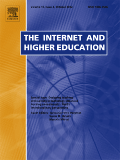
Internet and Higher Education
Exploring the Future of Learning in a Connected WorldWelcome to Internet and Higher Education, a premier journal published by Elsevier Science Inc, focusing on the dynamic intersection of technology and education. Established in 1998, this journal provides a platform for innovative research and critical discussions in the fields of Computer Networks and Communications, Computer Science Applications, and E-learning, consistently ranked in the Q1 quartile across multiple categories in 2023. With an impressive Scopus ranking placing it in the top 1% of Social Sciences and Computer Science categories, Internet and Higher Education aims to foster interdisciplinary collaboration and advance our understanding of digital learning environments. The journal invites contributions that explore the impact of the internet on higher education, offering tangible insights for educators, administrators, and policymakers alike. Stay updated on the latest findings and trends that are shaping the future of education through technology.